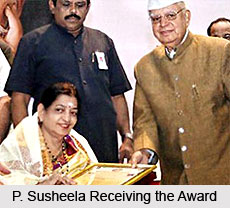 The Ramineni Foundation Awards are counted among the prestigious awards in India and is presented by the Ramineni Foundation. The Foundation was established in the year 1995 by the children of the late Ramineni Ayyanna Choudary in Cincinnati, Ohio, USA. The main objective behind its foundation was to protect and promote the monumental heritage of Indian culture and the ideals of Hinduism. The foundation is in a mission to facilitate the valiant, relentless and altruistic efforts of all those high priests drawn from a cross-spectrum of fields in arts, science and humanities. The Foundation was officially inaugurated in India for the first time on 12th October, 1999 at Hyderabad.
The Ramineni Foundation Awards are counted among the prestigious awards in India and is presented by the Ramineni Foundation. The Foundation was established in the year 1995 by the children of the late Ramineni Ayyanna Choudary in Cincinnati, Ohio, USA. The main objective behind its foundation was to protect and promote the monumental heritage of Indian culture and the ideals of Hinduism. The foundation is in a mission to facilitate the valiant, relentless and altruistic efforts of all those high priests drawn from a cross-spectrum of fields in arts, science and humanities. The Foundation was officially inaugurated in India for the first time on 12th October, 1999 at Hyderabad.
There are two divisions in the Ramineni Foundation Awards and the divisions are named as the Visishta Puraskaram and the Viseesha Puraskaram.
The list of the Ramineni Foundation Awardees is given below:
| Year | Visishta Puraskaram | Viseesha Puraskaram |
| 1999 | Dr. G. N. Rao, Director, L V, Prasad Eye Institute | Bapu (Artist), Ramana, Dr. Nanduri Rama Mohana Rao, Veteran journalist & Writer; Kalipatnam Rama Rao, Custodian of Telugu Story |
| 2000 | Dr. K. Varaprasad Reddy, MD Shantha Biotechnics | Dr. Lalji Singh, Director, CCMB; Dr. K. Viswanath, Cine Director; Kaloji Narayana Rao, Veteran Writer |
| 2001 | Prof. Chinchode Devender Reddi, Vice Chancellor, Osmania University | Volga, Popular Writer, M. A. Subhan,Founder, Kalasaagar; G. Nirmalmma, Veteran Artist |
| 2002 | Prof. Shantha Sinha, Secretary –Trustee, M. V. Foundation | Dr. Chukka Ramaiah (IIT); Dr. N. Koteswara Rao, Popular Writer; Syed MD. Arif, National Chief, Badminton Coach |
| 2003 | Dr. K. Anji Reddy, Chairman, Reddy Labs | C, Raghavachari; Rao Balasaraswathi Devi, Popular Singer; C. V. Krishna Rao, Social Worker & Writer |
| 2004 | Prof. Yarlagadda Nayudamma, Pediatric Surgeon, Guntur | T. L. Kanta Rao, Veteran Artist; Buddiga Subbarayan, Popular Writer; Hemalatha Lavanam, Secretary - SAMSKAR |
| 2005 | Dr. D. Nageswar Reddy, Gastroenterologist, Director, Asian Institute of Gastroenterology | Dr. Boyi Bhimanna, Veteran Writer; K. Sugunamani, Andhra Mahila Sabha, Navodaya Rama Mohana Rao, Navodaya Publishers, Vijayawada |
| 2006 | Padma Bhushan Dr. K. Srinath Reddy, Professor and Head of the Dept of Cardiology, AIIMS | Dr. Umar Alisha, Renowned Philanthropist; Prof. I. V. Chalapathi Rao, Eminent Academician; Smt Anjali Devi, Veteran Artist |
| 2007 | P. Ramachandra Rao, Director, Defence Institute of Advanced Technology | Nerella Venu Madhav, Cine Artist; P. Susheela, Playback singer; Reddi Raghavaiah, Author of children"s literature |
| 2008 | Dr. Kota Harinarayana (Raja Ramana Fellow), Former VC, University of Hyderabad | KVV Mallikarjuna Rao (Founder and promoter of Vetapalem Library), CV Rajagopala Rao (Veteran journalist), Smt. Ramaprabha (Senior actress) |






